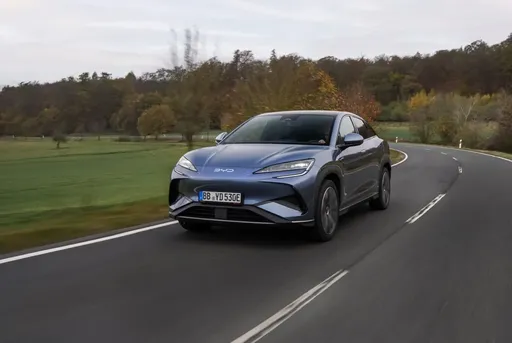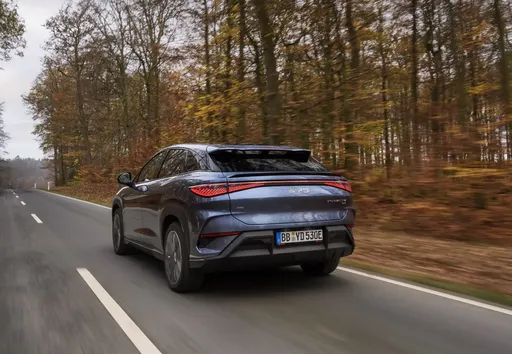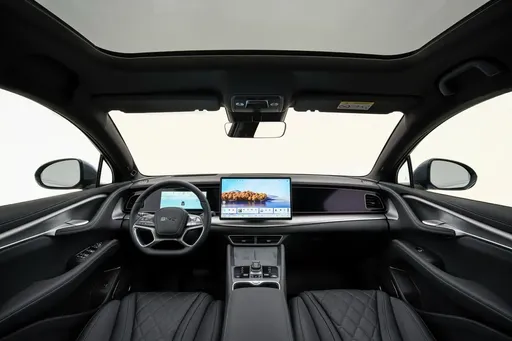When comparing two automotive powerhouses like the Hyundai Tucson and BYD Sealion 7, it's essential to delve deep into their specifications, technology, and overall driving experience. Both vehicles represent distinct philosophies; while the Tucson continues to build on Hyundai's reputation for quality and versatility, the Sealion 7 emerges as a bold entry in the electric SUV market, offering cutting-edge innovation and performance.
Hyundai Tucson vs BYD Sealion 7 – Który samochód bardziej do Ciebie pasuje?
Design and Dimensions
The Hyundai Tucson, with its modern and sharp lines, presents a sleek silhouette that’s both functional and stylish. Measuring 4510–4520 mm in length, 1865 mm in width, and 1650 mm in height, it features a spacious interior and a substantial trunk capacity of 546-620 liters, tailored for families and adventure seekers alike.
In contrast, the BYD Sealion 7 boasts a larger frame at 4830 mm long, 1925 mm wide, and 1620 mm high, providing an imposing presence on the road. While it has a slightly smaller trunk capacity of 520 liters, the Sealion 7 compensates with innovative interior layout options designed to maximize cargo space and comfort.
Engine Options and Performance
The powertrains represent a primary distinction between the two vehicles. The Hyundai Tucson offers a variety of engine types, including Diesel MHEV, Petrol MHEV, Full Hybrid, and Plug-in Hybrid options. The highest output variant delivers an impressive 252 HP, with torque figures peaking at 367 Nm. Fuel consumption ranges from a commendable 5.1 to 6.8 L/100 km, depending on the engine choice, making it an efficient option for both city and highway driving.
On the other hand, the BYD Sealion 7 is an all-electric SUV that provides a standout powertrain with options reaching up to 530 HP and a torque output of 690 Nm, delivering a thrilling acceleration of 0-100 km/h in just 4.5 seconds. With an electric range of up to 502 km and power consumption around 19.9 kWh/100 km, the Sealion 7 is engineered for efficiency and performance in the EV segment.
Transmission and Driving Experience
The Tucson offers versatile transmission options, including an Automatic variant featuring a Dual-Clutch system or a Manual gearbox, suitable for enthusiasts who enjoy a more hands-on driving experience. With available Front-Wheel and All-Wheel Drive configurations, it ensures dependable handling across a variety of terrains.
Conversely, the BYD Sealion 7 utilizes an Automatic transmission with a reduction gearbox, perfectly complemented by its rear-wheel or all-wheel drive setups. This setup promotes enhanced control and a seamless driving experience, characteristic of electric vehicles, where instant torque translates into swift acceleration and dynamic handling.
Innovations and Safety Features
The Hyundai Tucson integrates several cutting-edge technologies, including advanced safety features such as lane-keeping assist, adaptive cruise control, and a comprehensive suite of airbags. Additionally, it offers connectivity options such as Apple CarPlay and Android Auto for a modern infotainment experience.
In contrast, the BYD Sealion 7 is at the forefront of electric vehicle technology, with innovative features such as regenerative braking, over-the-air software updates, and a sophisticated battery management system that enhances efficiency and longevity. Safety features include a robust suite of driver assistance technologies covering everything from emergency braking to parking assistance.
Environmental Impact
The Hyundai Tucson’s various powertrains offer competitive CO2 efficiency ratings ranging from Class D to Class B, with emissions as low as 126 g/km, making it a responsible choice for eco-conscious drivers. Conversely, the BYD Sealion 7 boasts a CO2 efficiency class of A, with zero tailpipe emissions, underscoring its role as an environmentally friendly alternative to traditional combustion-engine vehicles.
Conclusion: Which One to Choose?
The choice between the Hyundai Tucson and BYD Sealion 7 ultimately comes down to the preferences of the driver. The Tucson is a solid, versatile SUV with a dynamic range of engines catering to varying needs, while the Sealion 7 represents the future of driving with its all-electric powertrain, rapid acceleration, and comprehensive tech features. Each vehicle offers compelling arguments, ensuring you’ll find either model equipped to serve diverse lifestyles and values in the ever-evolving automotive landscape.
Szczegóły techniczne: konkretne różnice między modelami
Koszty i zużycie
Cena i efektywność to kluczowe czynniki przy zakupie auta – właśnie tu często widać największe kontrasty.
Hyundai Tucson ma zauważalny przewagę cenową – jego cena zaczyna się od 157000 zł, podczas gdy BYD Sealion 7 kosztuje 219600 zł. Różnica wynosi około 62598 zł.
Pod względem zasięgu BYD Sealion 7 wypada znaczący lepiej: osiąga do 502 km, czyli około 432 km więcej niż Hyundai Tucson.
Silnik i osiągi
Moc, moment obrotowy i przyspieszenie wiele mówią o tym, jak auto prowadzi się na co dzień. Tu widać, kto oferuje więcej dynamiki.
Pod względem mocy silnika BYD Sealion 7 ma wyraźny przewagę – 530 KM zamiast 252 KM. To różnica około 278 KM KM.
W przyspieszeniu 0–100 km/h BYD Sealion 7 jest wyraźny szybszy – 4.50 s wobec 7.90 s. Różnica wynosi około 3.40 s sekundy.
Pod względem prędkości maksymalnej BYD Sealion 7 jest minimalny lepszy – osiąga 215 km/h, podczas gdy Hyundai Tucson kończy na 204 km/h. Różnica to około 11 km/h.
Różnica widoczna jest również w momencie obrotowym: BYD Sealion 7 ciągnie przekonujący mocniej – 690 Nm wobec 379 Nm. Różnica to około 311 Nm.
Przestrzeń i praktyczność
Samochód rodzinny czy codzienny towarzysz – który oferuje więcej miejsca, komfortu i elastyczności?
Oba samochody oferują miejsce dla 5 osób.
Pod względem masy własnej Hyundai Tucson jest znaczący lżejszy – 1542 kg wobec 2225 kg. Różnica to około 683 kg kg.
Pod względem pojemności bagażnika Hyundai Tucson oferuje nieco więcej miejsca – 620 L wobec 520 L. To różnica około 100 L litrów.
W maksymalnej pojemności ładunkowej Hyundai Tucson wypada prawie niezauważalny lepiej – do 1799 L, czyli o około 10 L więcej niż BYD Sealion 7.
Pod względem ładowności Hyundai Tucson wypada wyraźny lepiej – 545 kg wobec 410 kg. Różnica to około 135 kg kg.
Kto zostaje zwycięzcą?
Podsumowując, BYD Sealion 7 jest wygrywa pojedynek wyraźnie i zasługuje na tytuł DriveDuel Champion.
Oferuje lepszy, bardziej zrównoważony pakiet i jest praktyczniejszym towarzyszem na co dzień.
Koszty i Zużycie
Zobacz analizę szczegółową
Silnik i Wydajność
Zobacz analizę szczegółową
Wymiary i Nadwozie
Zobacz analizę szczegółową
 @ BYD Auto / BYD Global Media
@ BYD Auto / BYD Global Media
BYD Sealion 7
Hyundai Tucson
Hyundai Tucson to stylowy i praktyczny SUV, który łączy wyrazisty wygląd z codzienną użytecznością — sprawdzi się równie dobrze w miejskim zgiełku, co podczas weekendowych wypadów. Wnętrze jest przemyślane i wygodne, a nowoczesne rozwiązania ułatwiają życie kierowcy, bez potrzeby przepłacania.
szczegóły @ Hyundai Motor Company
@ Hyundai Motor Company
 @ Hyundai Motor Company
@ Hyundai Motor Company
 @ Hyundai Motor Company
@ Hyundai Motor Company
 @ Hyundai Motor Company
@ Hyundai Motor Company
 @ Hyundai Motor Company
@ Hyundai Motor Company
BYD Sealion 7
BYD Sealion 7 to elektryczny sedan o smukłej linii i eleganckim wnętrzu, który śmiało chce wyróżnić się na zatłoczonych ulicach. Dla kupującego to rozsądna, nowoczesna propozycja — komfortowa w codziennej jeździe, pełna praktycznych rozwiązań i z charakterem, który potrafi wywołać uśmiech.
szczegóły @ BYD Auto / BYD Global Media
@ BYD Auto / BYD Global Media
 @ BYD Auto / BYD Global Media
@ BYD Auto / BYD Global Media
 @ BYD Auto / BYD Global Media
@ BYD Auto / BYD Global Media
 @ Hyundai Motor Company
@ Hyundai Motor Company
|
 @ BYD Auto / BYD Global Media
@ BYD Auto / BYD Global Media
|
|
|
|
Koszty i Zużycie |
|
|---|---|
|
Cena
157000 - 237400 zł
|
Cena
219600 - 267900 zł
|
|
Zużycie L/100km
1 - 7.6 L
|
Zużycie L/100km
-
|
|
Zużycie kWh/100km
-
|
Zużycie kWh/100km
19.9 - 21.9 kWh
|
|
Zasięg elektryczny
64 - 70 km
|
Zasięg elektryczny
456 - 502 km
|
|
Pojemność baterii
-
|
Pojemność baterii
-
|
|
CO2
22 - 172 g/km
|
CO2
0 g/km
|
|
Pojemność zbiornika paliwa
42 - 54 L
|
Pojemność zbiornika paliwa
-
|
Wymiary i Nadwozie |
|
|---|---|
|
Typ nadwozia
SUV
|
Typ nadwozia
SUV
|
|
Miejsca siedzące
5
|
Miejsca siedzące
5
|
|
Drzwi
5
|
Drzwi
4
|
|
Masa własna
1542 - 1889 kg
|
Masa własna
2225 - 2435 kg
|
|
Pojemność bagażnika
546 - 620 L
|
Pojemność bagażnika
520 L
|
|
Długość
4510 - 4535 mm
|
Długość
4830 mm
|
|
Szerokość
1865 mm
|
Szerokość
1925 mm
|
|
Wysokość
1650 mm
|
Wysokość
1620 mm
|
|
Maksymalna pojemność bagażnika
1721 - 1799 L
|
Maksymalna pojemność bagażnika
1789 L
|
|
Ładowność
523 - 545 kg
|
Ładowność
410 kg
|
Silnik i Wydajność |
|
|---|---|
|
Typ silnika
Mild Hybrid Diesel, Hybryda Plug-in, Benzyna, Pełna Hybryda
|
Typ silnika
Elektryczny
|
|
Skrzynia biegów
Automatyczna, Manuel
|
Skrzynia biegów
Automatyczna
|
|
Szczegóły skrzyni biegów
Automatyczna dwusprzęgłowa, Automatyczna skrzynia biegów, Manualna skrzynia biegów
|
Szczegóły skrzyni biegów
Reduktor
|
|
Rodzaj napędu
Napęd na przednie koła, Napęd na cztery koła
|
Rodzaj napędu
Napęd na tylne koła, Napęd na cztery koła
|
|
Moc KM
136 - 252 KM
|
Moc KM
313 - 530 KM
|
|
Przyspieszenie 0-100km/h
7.9 - 11.6 s
|
Przyspieszenie 0-100km/h
4.5 - 6.7 s
|
|
Maksymalna prędkość
180 - 204 km/h
|
Maksymalna prędkość
215 km/h
|
|
Moment obrotowy
250 - 379 Nm
|
Moment obrotowy
380 - 690 Nm
|
|
Liczba cylindrów
4
|
Liczba cylindrów
-
|
|
Moc kW
100 - 185 kW
|
Moc kW
230 - 390 kW
|
|
Pojemność silnika
1598 cm3
|
Pojemność silnika
-
|
Ogólne |
|
|---|---|
|
Rok modelowy
2024 - 2025
|
Rok modelowy
2024
|
|
Klasa efektywności CO2
E, B, F, D
|
Klasa efektywności CO2
A
|
|
Marka
Hyundai
|
Marka
BYD
|
Jakie rodzaje napędu ma Hyundai Tucson?
Dostępne wersje obejmują Napęd na przednie koła albo Napęd na cztery koła.
Wyświetlane ceny i dane są szacunkowe, oparte na niemieckich cenach katalogowych i mogą się różnić w zależności od kraju. Te informacje nie stanowią wiążącej oferty.
